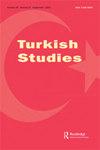Only game in town? the persistence of competitive authoritarian regimes in modern Turkey
IF 1.7
3区 社会学
Q1 AREA STUDIES
引用次数: 0
Abstract
ABSTRACT Why do so many regimes remain competitive authoritarian? This article argues that institutional path dependence explains the persistence of competitive authoritarian regimes in which electoral competition exists, but is unfair. The weakness of institutions regulating free and fair interparty competition, like multi-candidate elections, a constitution and statutes safeguarding fundamental rights, and intraparty competition, like intraparty democracy, is path-dependent and self-reinforcing. In settings where competition is partly free and fair, ruling elites have an incentive to combine democratic and undemocratic laws and policies to defeat counterelites and neutralize intraparty competitors. The likely long-term outcome is a vicious cycle of limited democratization, competitive authoritarian regime formation, and competitive authoritarian regime consolidation. I assess the argument by tracing the historical trajectory of reforms on constitutionalism, civil liberties, and multi-candidate competition in post-1950 Turkey, where the limits on interparty and intraparty competition have been reproduced in remarkable historical continuity.镇上唯一的游戏?现代土耳其持续存在的竞争性独裁政权
为什么如此多的政权仍然是竞争性的威权主义?本文认为制度路径依赖解释了选举竞争存在但不公平的竞争性专制政权的持续存在。管理自由和公平的党间竞争的制度,如多候选人选举,保障基本权利的宪法和法规,以及党内竞争,如党内民主,都是路径依赖和自我强化的。在竞争是部分自由和公平的环境中,统治精英有动机将民主和非民主的法律和政策结合起来,以击败反精英和中和党内竞争对手。可能的长期结果是一个有限民主化、竞争性威权政权形成和竞争性威权政权巩固的恶性循环。我通过追溯1950年后土耳其在宪政、公民自由和多候选人竞争方面改革的历史轨迹来评估这一论点,在土耳其,党际和党内竞争的限制在显著的历史连续性中得到了再现。
本文章由计算机程序翻译,如有差异,请以英文原文为准。
求助全文
约1分钟内获得全文
求助全文
来源期刊

Turkish Studies
AREA STUDIES-
CiteScore
2.80
自引率
7.70%
发文量
44
期刊介绍:
Turkey is a country whose importance is rapidly growing in international affairs. A rapidly developing democratic state with a strong economy, complex society, active party system, and powerful armed forces, Turkey is playing an increasingly critical role in Europe, the Middle East, and the Caucasus. Given Turkey"s significance and the great interest in studying its history, politics, and foreign policy, Turkish Studies presents a forum for scholarly discussion on these topics and more.
 求助内容:
求助内容: 应助结果提醒方式:
应助结果提醒方式:


